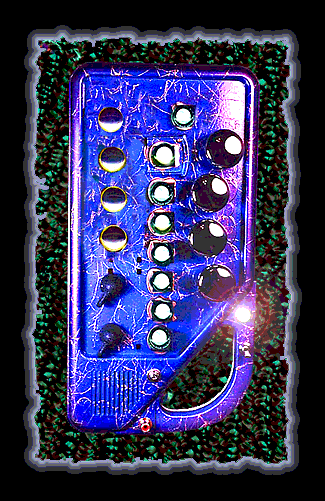An extreme animal cry engine, the Morpheum is primarily a body contact
instrument whereby the player conducts electricity through their own
flesh in playing it.
A recent web posting from Reed:
"When I felt the jolts of electricity coursing through my body back
in '67 as I began playing the Odor Box body-contacts, it struck me that
I had become part of the instrument's circuitry, as in-the-matrix as
any other component on the board. The circuit no longer was limited
to dead matter. It didn't stop at its "ends" anymore... and neither
did I. This is definitely a new creature, it lives and shares electricity...
the same electricity that, if taken away, would cause each to die.
"What is this musical bio-electronic audiosapien? What place has this
species in soundkind?"
The Morpheum is an animal/machine synthesizer. Unaffected it is very
raw sounding, a very aggressive tangle-of-sound machine. It is best
at garish, howling sounds and sharp, quick little voices. Through the
use of effects (stop at nothing here, but include a volume pedal and
a little ultra smooth reverb), a fantastically expressive alien lead
voice can be created. Being an extremely sensitive body-contact instrument,
the Morpheum as controller of effect chains is just outrageous... digital
sounds, with real-time analog control of ultra wide pitch bending.
Morpheums can be worn with a strap like an accordion (with the addition
of strap locks), or set flat like a keyboard.
Additions include two frequency dials (for setting the initial pitches
of the two sample bank's voices), four large metallic body-contacts
(bridged with the fingers for real-time analog pitch bending), speaker
switch (for turning off the internal monitor speaker), gold-plated RCA
output (for feeding effects, mixer and amps), power switch, and blue
LED power indicator behind a vintage numbered or lettered glass pilot
lens. Requires four "AA" cells.
Morpheums are finished in crackled fluorescent colors involving many
coats of paints & glosses, including a dusting of holographic powder
making the instrument shimmer with spectra in direct light. Control
titles are hand-inked.
More from Reed's EMI article on the Morpheum:
"Unlike other sample banks discussed in this series of articles in EMI,
the Morpheum relies heavily upon body-contacts for inter-flesh modulation
as well as the ability to layer its digital recordings. "Has anyone
recognized this instrument yet? The original device, like some of the
circuit-bent devices discussed earlier in previous articles, was a children's
toy, depicting an old-fashioned train. Its four wheels (now under the
four pearloid accordion keys visible in the photograph) could be pressed
for locomotive sounds. It carried eight animals (now under the computer
keys) which when pushed released their own voice samples as well. The
mechanical sounds consist of steam whistle, bell, engine, and railroad
track rhythm; the animals aboard are rooster, lion, dog, cat, horse,
goat, cow, and elephant.
"Circuit-bending adds to this instrument a set of four body-contacts,
two potentiometers, a sky blue pilot light, a speaker cut-out switch,
and RCA-type line output. Strap fasteners can be added to the upper
housing sides so that the unit can be worn as an accordion, left hand
on the four body-contacts, right hand on the keys.
"Most important of the circuit-bending additions are the conductive
flesh contacts. These are chrome drawer pulls wired to sensitive traces
on the circuit board. Each sample bank (animal and machine) contains
a pair of these metallic mushrooms which, when bridged with the fingers,
change the pitch of the sample in play. However, volume and disintegration
effects are possible by cross-touching these separate pairs, bending
between the banks as well as simply within each. In this way, either
mechanical or animal sounds can be themselves modified or even blended
into one another.
"Because slowing-down digital audio streams produces such fascinating
results, each sample bank now contains potentiometers (variable resistors)
dedicated to this function. These dials can be pre-set to create special
voices far outside the sample's usual personality. Doppler effects,
metallic notch filter effects, and many other single-voice modifications
are possible by these means. Of course, after these banks are initialized
in this manner, pitches and tones set, body contact changes as noted
before are additionally possible to further reshape and combine the
voices as electricity flows through the player's fingers, the musician
having become a very active section of the circuit, truly a living electronic
experimental musical instrument in the most literal sense."




.jpg)
